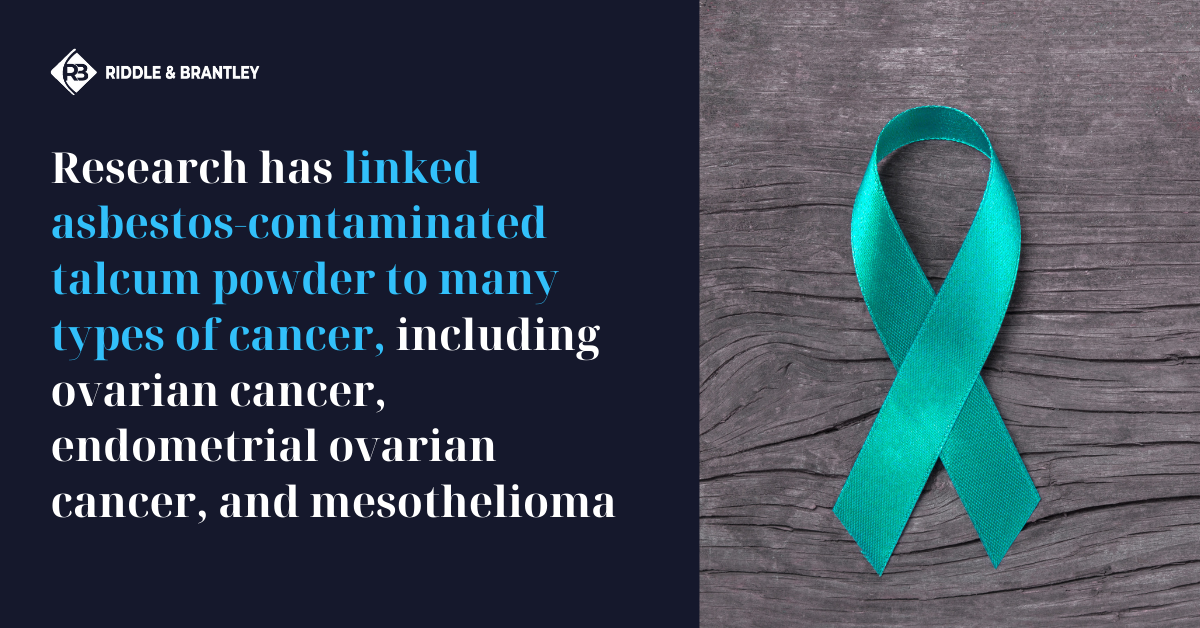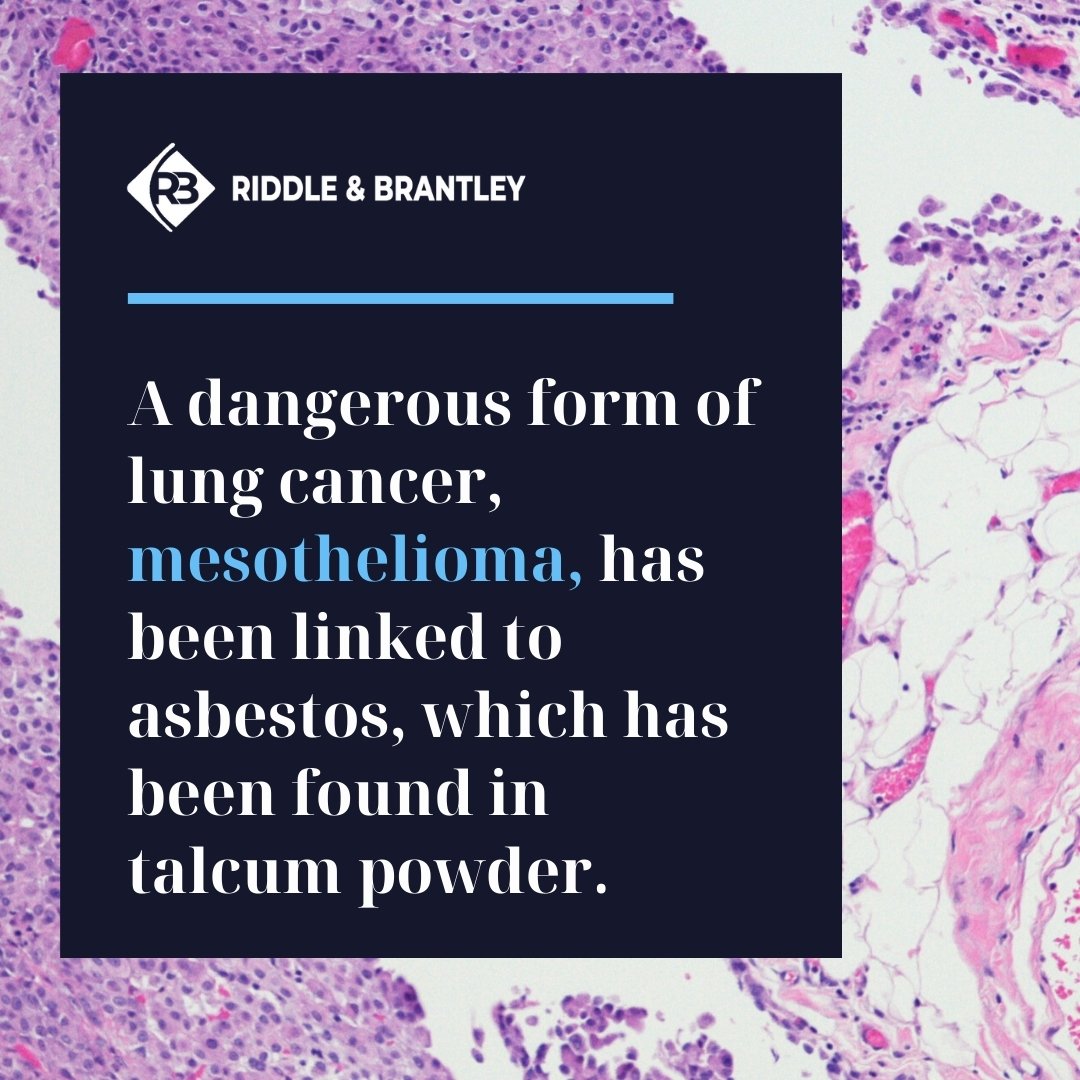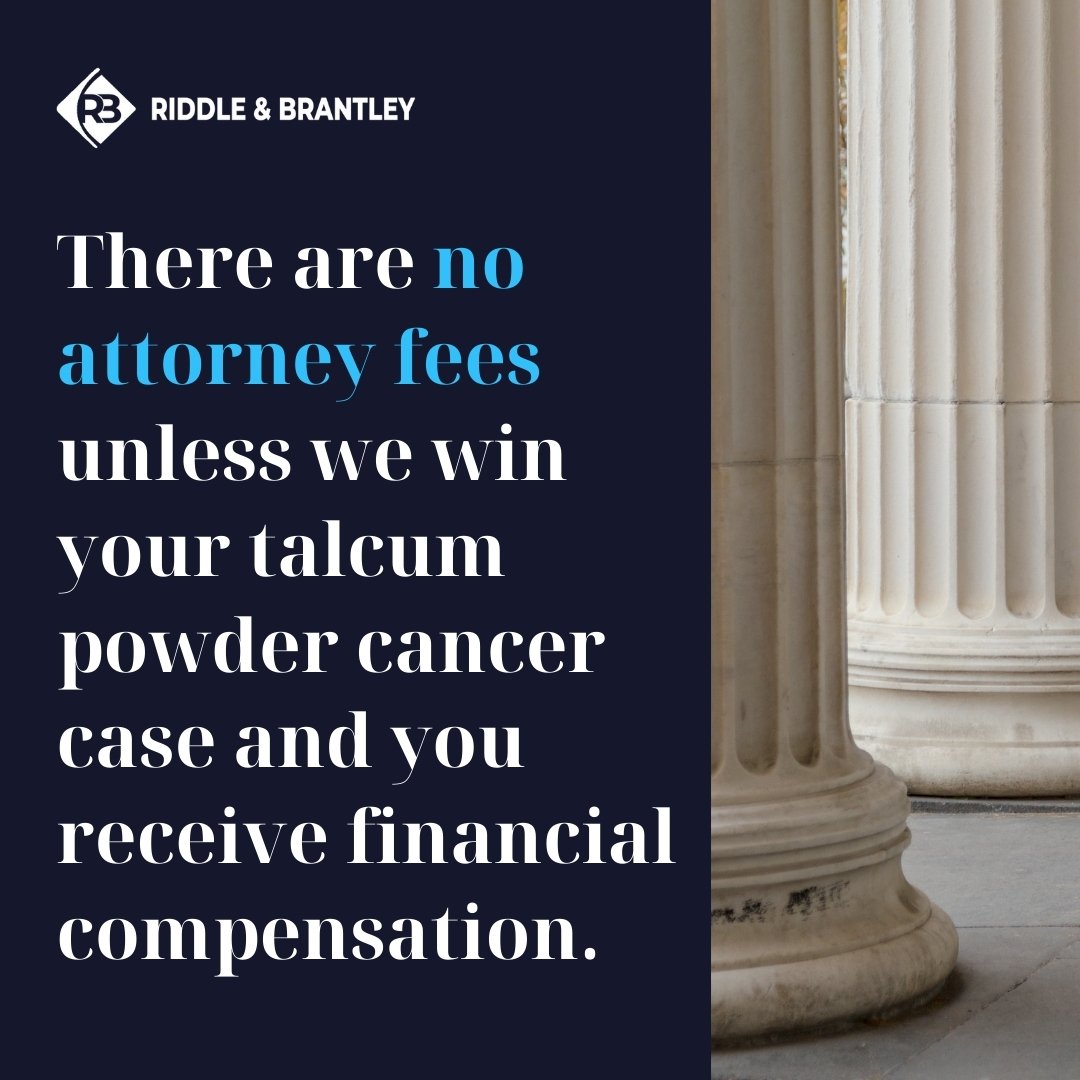“What Kind of Cancer Does Talcum Powder Cause?”
In the wake of Johnson & Johnson’s first-ever recall of talcum powder for asbestos contamination, many are asking, “What kind of cancer does baby powder cause?” If you’re wondering what kind of cancer is caused by talcum powder, we’ll explore that question in this blog post.
IMPORTANT: If you’ve been diagnosed with cancer after using Johnson & Johnson talc-based baby powder, you may be entitled to compensation and you deserve justice. For a FREE, no-obligation consultation with a talcum powder lawsuit attorney about your potential claim, please call 1-800-525-7111.
As always, there are no upfront costs and you won’t pay any attorney fees unless we win your baby powder cancer case and you receive compensation.
For a FREE, no-obligation consultation with an experienced talcum powder lawyer today, call 1-800-525-7111.
“What kind of cancer is caused by talc-based baby powder?”
In order to evaluate this question, it’s most helpful to review the facts of the recent baby powder cancer claims against Johnson & Johnson.
Cancer-Causing Asbestos Contamination in Johnson & Johnson Talcum Powder
 For decades, allegations have been made that Johnson & Johnson knew that its talcum powder was contaminated with asbestos, and did nothing to warn consumers. Asbestos is a known cancer-causing substance.
For decades, allegations have been made that Johnson & Johnson knew that its talcum powder was contaminated with asbestos, and did nothing to warn consumers. Asbestos is a known cancer-causing substance.
In particular, it is alleged that women who used Johnson & Johnson talc-based baby powder for feminine hygiene in the genital area, developed ovarian cancer, endometrial ovarian cancer, and mesothelioma as a result. These are three potentially deadly cancers, all of which have been tied to asbestos exposure.
Thousands of lawsuits have been filed against Johnson & Johnson, alleging that potential victims developed ovarian cancer, endometrial ovarian cancer, and mesothelioma.
What Does the Research Say?
In answering the question, “What kind of cancer does talcum powder cause?”, let’s look at the research.
Scientific research supports a strong connection between asbestos and cancer. In fact, the American Cancer Society and the World Health Organization have both recognized a strong link between exposure to talc products by women and the risk of uterine cancers such as ovarian cancer and endometrial ovarian cancer.
A landmark 2010 study also linked the use of talcum powder in the genital area to uterine cancer risk. The study suggested that talc particles could enter the lining of the uterus (endometrium) and cause inflammation, leading to cancer.
The link between asbestos exposure and mesothelioma is even clearer. For decades, it has been established that exposure to asbestos can cause a rare and often fatal type of cancer known as mesothelioma. The American Cancer Society has developed a comprehensive guide to the link between asbestos and mesothelioma.
Types of Cancer Potentially Caused by Talcum Powder: The Short Answer
Based on the evidence, the answer to the question, “What kind of cancer does talcum powder cause?” seems increasingly clear:
Research suggests that the use of asbestos-contaminated talc-based baby powder may cause ovarian cancer, endometrial ovarian cancer, or mesothelioma.
Those who have suffered ovarian cancer or endometrial ovarian cancer after prolonged exposure to Johnson & Johnson talcum powder products may be entitled to compensation.
For a FREE consultation with an experienced talcum powder cancer lawyer, please call 1-800-525-7111 today.
We will review your claim, advise you on your best available legal options, and if you decide to hire us we will fight tirelessly on your behalf for the justice and compensation you deserve.
Call 1-800-525-7111 today and let’s review your potential Johnson & Johnson baby powder cancer claim.
“What about lung cancer?”
 For decades, an aggressive form of lung cancer called mesothelioma has been linked to exposure to asbestos. This link is well-documented by the evidence. Thousands of individuals have alleged that exposure to asbestos contained in talc-based powders caused mesothelioma.
For decades, an aggressive form of lung cancer called mesothelioma has been linked to exposure to asbestos. This link is well-documented by the evidence. Thousands of individuals have alleged that exposure to asbestos contained in talc-based powders caused mesothelioma.
In 2018, a jury ordered Johnson & Johnson and a talc distributor to pay $117 million in damages to a man who claimed that decades-long use of J&J baby powder caused his mesothelioma cancer. Unsealed documents in the trial revealed that Johnson & Johnson knew that its baby powder was potentially contaminated with asbestos as early as the 1960s, and did nothing to warn consumers.
So the answer is yes, the research indicates that talcum powder may cause lung cancer — in particular, mesothelioma.
Quick Recap
In short, the answer to the question “What kind of cancer does talcum powder cause?” is that asbestos-contaminated talc-based baby powder may cause ovarian cancer, endometrial ovarian cancer, and mesothelioma.
Our firm is actively investigating Johnson & Johnson talcum powder cancer claims, and we are ready to help however we can. Please call 1-800-525-7111 for a free, no-obligation consultation with our experienced product liability attorneys.

“I’ve been diagnosed with cancer and I believe Johnson & Johnson talcum powder is responsible. What can I do?”
If Johnson & Johnson talc-based baby powder caused your cancer, you deserve justice, and we are ready to help however we can.
If you’ve been diagnosed with ovarian cancer or endometrial ovarian cancer after using Johnson & Johnson talcum powder, call 1-800-525-7111 or complete the short form below for a FREE, no-obligation consultation.
There are no upfront costs and, as always, you won’t pay a dime in attorney fees unless we win your case and you receive compensation for your talcum powder cancer claim.
IMPORTANT: As of August 2023, we can no longer accept claims involving mesothelioma potentially linked to talcum powder, only those involving ovarian cancer or endometrial ovarian cases, due to developments in this litigation.
Call 1-800-525-7111 today for a free case review.
 Since 1985, Riddle & Brantley has secured many significant judgments and settlements for victims of injury due to other individuals’ or companies’ negligence. In fact, we recently secured $850,000 for a victim of mesothelioma due to asbestos exposure (see disclaimer below).
Since 1985, Riddle & Brantley has secured many significant judgments and settlements for victims of injury due to other individuals’ or companies’ negligence. In fact, we recently secured $850,000 for a victim of mesothelioma due to asbestos exposure (see disclaimer below).
Our team of talcum powder lawyers is led by Gene Riddle, who is recognized for his experience and results by such organizations as The National Association of Distinguished Counsel, The National Trial Lawyers Top 100, Multi-Million Dollar Advocates Forum, and others. He is the recipient of the 2014 Litigator Award and maintains a top-ranked AV Preeminent rating from Martindale-Hubbell (see disclaimer below).
“This settlement changed me and my family’s lives.”
–Linda B., Riddle & Brantley client
For a FREE consultation concerning your potential talcum powder cancer lawsuit or claim, please call 1-800-525-7111.
There is no obligation and you won’t pay any attorney fees unless we recover compensation for you.
Justice Counts for those diagnosed with cancer potentially due to asbestos-contaminated talcum powder and we are ready to help however we can.
*** Disclaimer: The results mentioned are intended to illustrate the type of cases handled by the firm. These results do not guarantee a similar outcome, and they should not be construed to constitute a promise or guarantee of a particular result in any particular case. Every case is different, and the outcome of any case depends upon a variety of factors unique to that case.
*** Disclaimer: An attorney must meet certain requirements to join these organizations or receive these awards. For more information on Membership Criteria for Million Dollar Advocates Forum, Multi-Million Dollar Advocates Forum, Super Lawyers, The National Trial Lawyers Top 100, The National Association of Distinguished Counsel, AV Preeminent by Martindale-Hubbell, and the Litigator Award, please visit our Membership Criteria page. These awards and memberships should not be construed as a promise or guarantee of a similar result. Each case is different and must be evaluated separately.